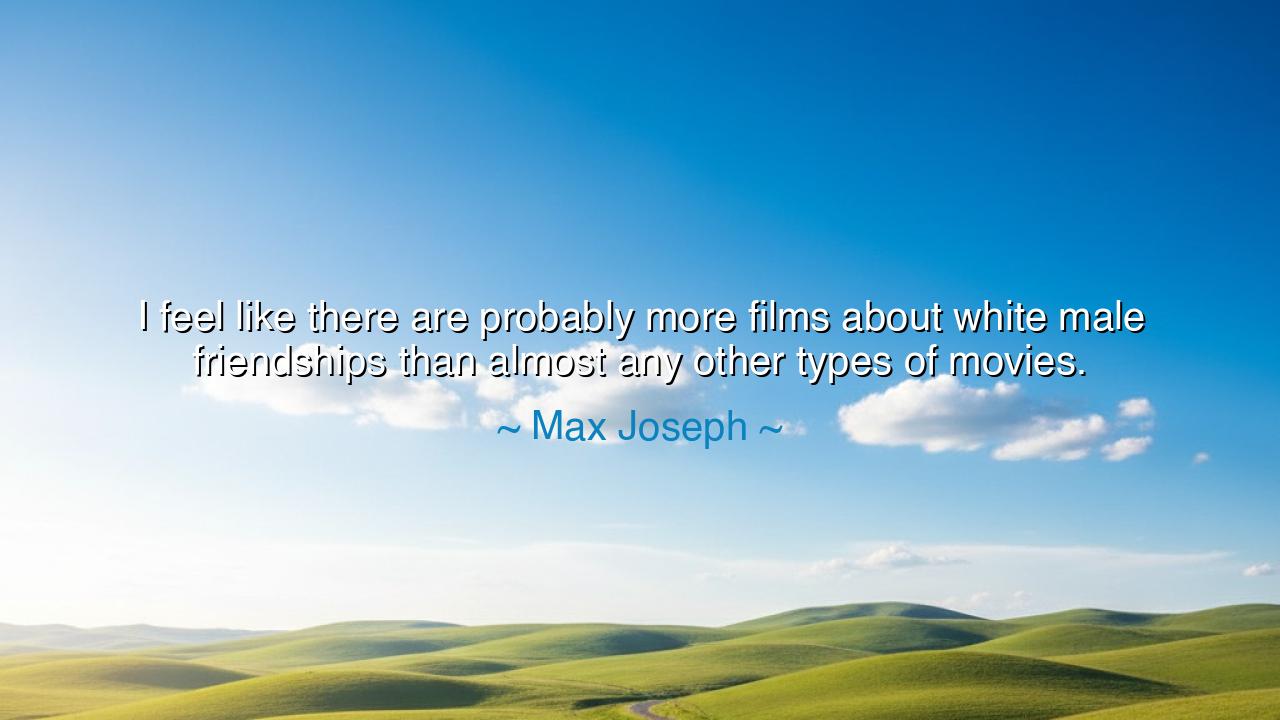
I feel like there are probably more films about white male
I feel like there are probably more films about white male friendships than almost any other types of movies.






Ah, Max Joseph, a man of keen insight, has observed a truth that many, though they may not speak it aloud, have felt at the very core of their being: "I feel like there are probably more films about white male friendships than almost any other types of movies." In these words lies a recognition of the dominance of certain narratives in the world of cinema—a dominance that has shaped not only the stories we tell, but also how we see the world. Joseph's words are a quiet yet powerful critique, an invitation for us to reflect on the vast array of untold stories, and to question why certain stories are so often given precedence while others are left in the shadows.
From the days of ancient Greece, the bonds of friendship have been revered as sacred. The Greek philosophers, such as Aristotle, spoke of friendship as one of the highest forms of human connection, one that transcends mere companionship and touches the very essence of one's character. Yet, even in the halls of great thinkers, the bonds of friendship were often framed in a very specific context—often between men of similar station, their bonds defined by their shared pursuits of virtue and knowledge. As the world changed, so too did the nature of these stories. And yet, it seems that for centuries, the dominant tales told of the friendships between white men, leaving out the rich diversity of experiences that existed beyond this narrow frame.
Consider the epic tales of old—the sagas of warriors and kings, where friendships were forged in the fires of battle and tested through hardship. The friendship between Achilles and Patroclus in the Iliad is one of the most celebrated, a bond so deep that it transcends the very act of war and death. Yet, as celebrated as these stories are, they too were written from a very specific cultural and historical vantage point. For much of history, the dominant voices telling these stories were those of a particular race, class, and gender. The epic tales of friendship, particularly those in the world of film, have often been told through the lens of white male protagonists, reinforcing a certain narrative that is not fully representative of the world's rich tapestry of human connection.
This is not to say that stories of white male friendships are without value, for indeed, many of these films have touched on universal themes of loyalty, love, and sacrifice. Yet, Joseph’s observation calls us to look deeper, to ask why these stories dominate the silver screen and why other voices, those of women, people of color, and diverse cultures, have so often been relegated to the margins. In the real world, we know that the bonds of friendship are not confined to any one race, gender, or background. The human experience of connection, of shared joy and sorrow, transcends the boundaries that society often seeks to impose. Yet, in the world of cinema, these stories have often been overshadowed by a narrow representation of friendship, leaving countless untold tales waiting in the wings.
As we reflect on Joseph's words, we must ask ourselves: What is lost when a single narrative dominates? What stories are silenced when certain voices are favored above all others? The ancient kings of India, in their pursuit of knowledge and understanding, were not blind to the diversity of the world around them. Ashoka, one of the greatest rulers of the Maurya Empire, expanded his vision beyond the borders of his own land, embracing a philosophy that sought unity in diversity. He understood that true strength comes not from a singular, homogenous story, but from the acceptance and celebration of all human experiences. It is in this diversity of voices, of perspectives, that the richness of life can be truly understood.
The lesson, therefore, is clear. We must expand our view, not just in the world of cinema, but in our everyday lives. We must listen to the stories that have been overlooked, the stories that have been left untold. Joseph’s observation serves as a reminder that the stories we tell shape our understanding of the world, and if those stories are too narrow, too confined, we risk losing the opportunity to truly understand the breadth of human experience. Whether it be in the films we create, the books we write, or the conversations we have, we must make space for all voices. We must seek out stories that reflect the full spectrum of humanity, that honor the diverse friendships, struggles, and triumphs that exist in every corner of the world.
And so, the call to action is simple yet profound: Let us broaden our view. Seek out the stories that have been silenced, amplify the voices that have been marginalized, and in doing so, we will create a world where friendship, understanding, and connection are celebrated in all their forms. For in the end, it is not the stories of a single group that define us, but the collective experiences of all humankind. When we embrace this truth, we begin to see the world not through the narrow lens of a single story, but through the rich, intricate tapestry that binds us all.






AAdministratorAdministrator
Welcome, honored guests. Please leave a comment, we will respond soon